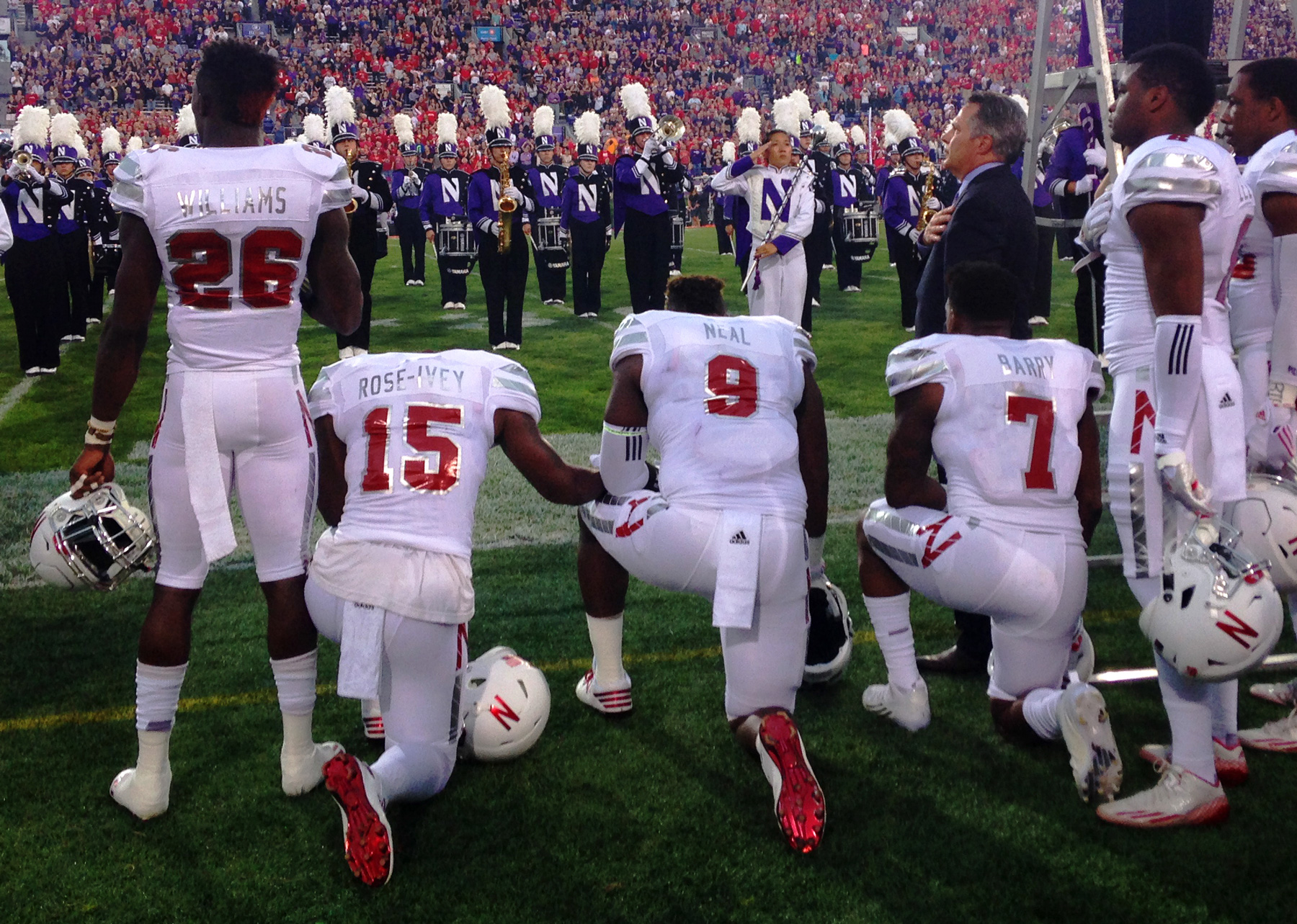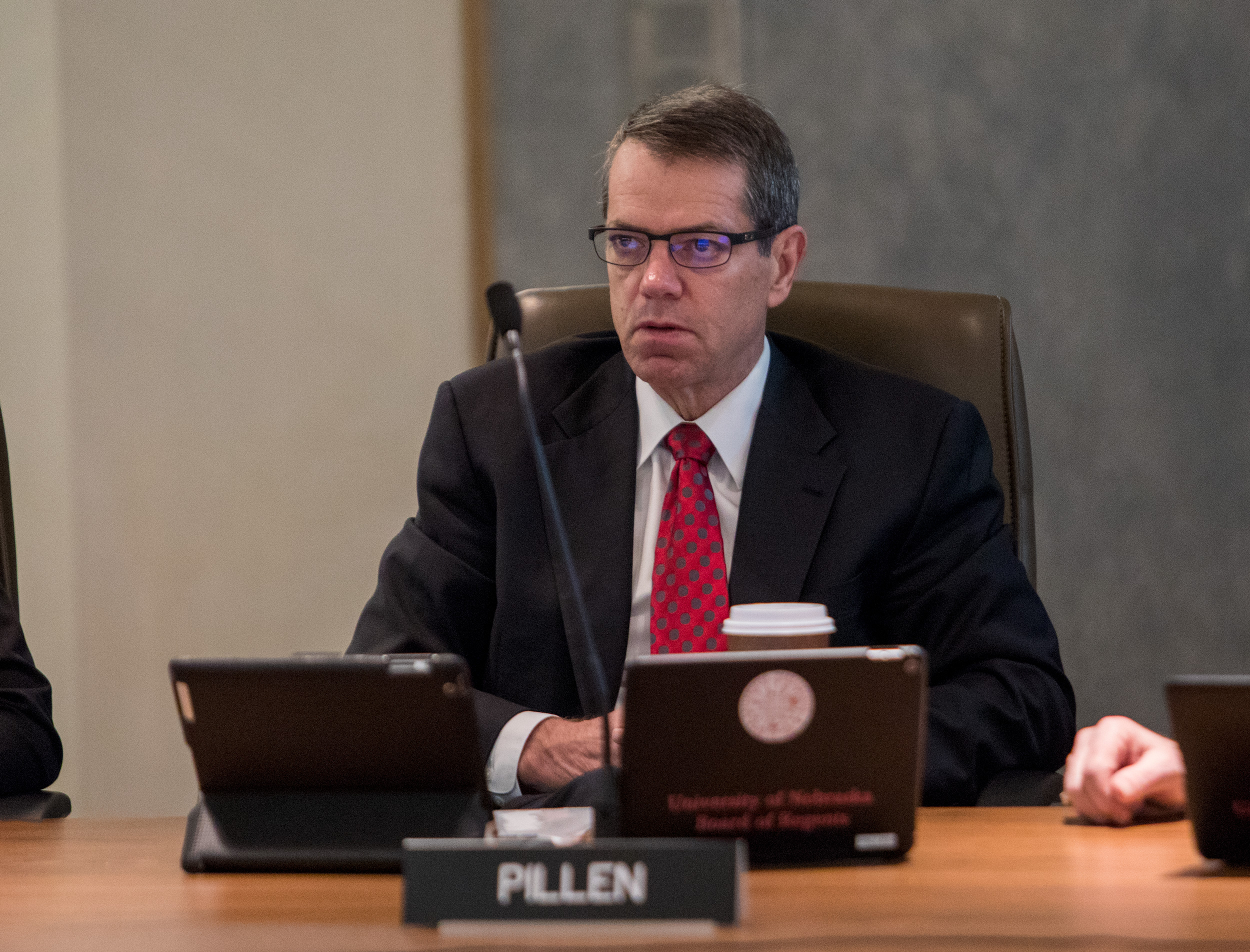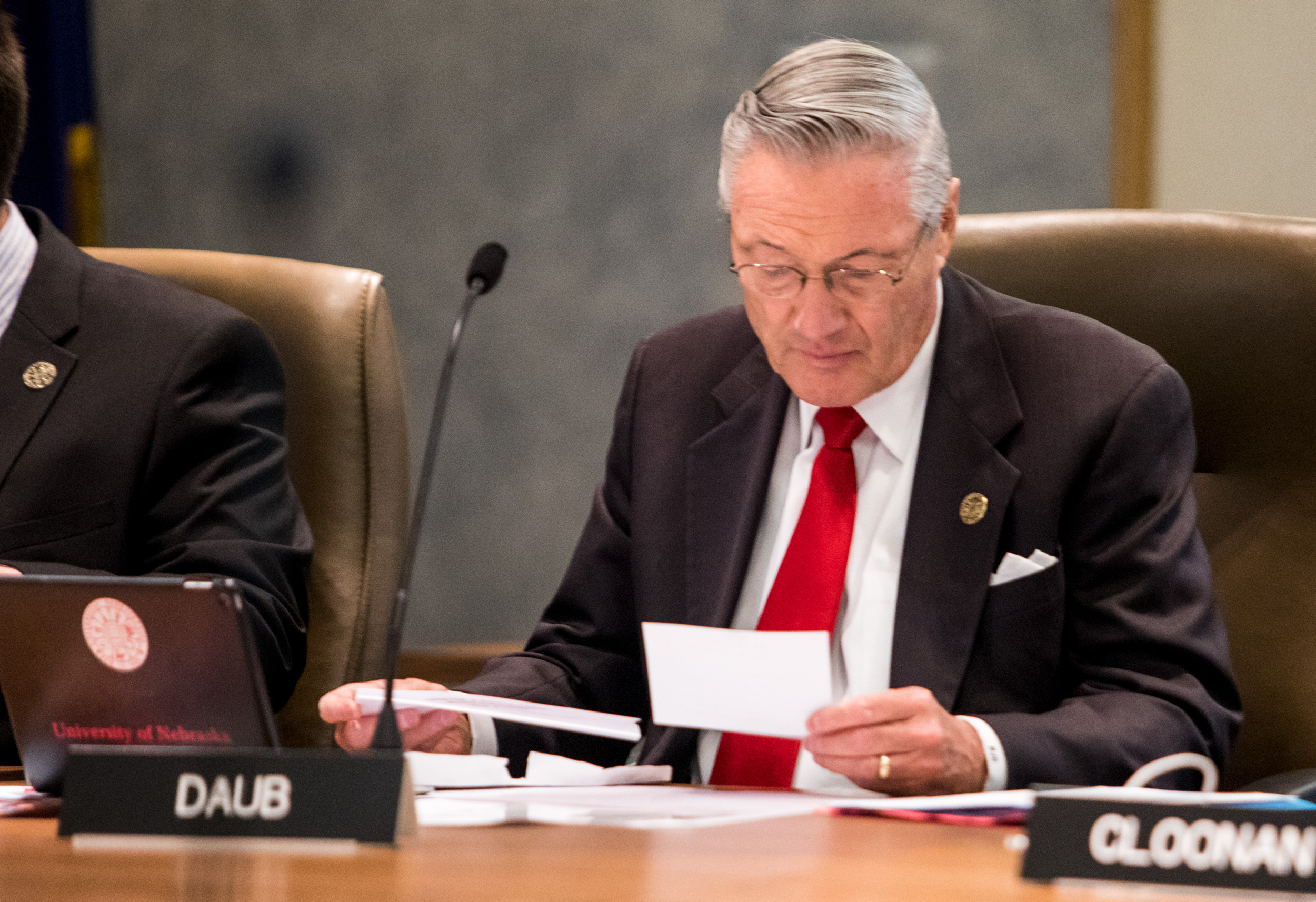

Michael Rose-Ivey’s protest sparks UNL conversation on student-athlete speech
As Michael Rose-Ivey looked into the stands, he knew there would be backlash. He knew people wouldn’t be happy. But he was going to do it anyway.
When 40,284 fans rose in unison for the national anthem, Rose-Ivey and teammates DaiShon Neal and Mohamed Barry removed their helmets and knelt.
It was September 24, 2016. A beautiful fall night in Evanston, Illinois, perfect for football.
Northwestern and Nebraska lined up on the sidelines as an announcement reverberated through the loudspeaker in one of the Big Ten’s smallest stadiums.
After Northwestern public address announcer Gary Ross asked fans to remove their caps and rise for the playing of the national anthem, all eyes darted down to the three players on the Nebraska sideline.
Former linebacker Michael Rose-Ivey’s decision to kneel was inspired by ex-San Francisco 49ers quarterback Colin Kaepernick. This sparked a national discussion regarding racial equality and police brutality.
Americans began to question whether it was appropriate for professional athletes to use their fame as a platform to speak out about social issues.
When collegiate athletes around the United States decided to participate in this form of silent protest, the dialogue took on a similar tone. But this time the discussion included an additional consideration.
As they began to speak about racial tensions and other relevant social issues, people questioned where the balance lied between athletes’ right to free speech and representation of their schools.
Rose-Ivey, Neal and Barry brought that conversation to Nebraska.
The Internet erupted.
While there was a significant amount of support for the three Huskers, they also faced a wave of outrage.
Chancellor Ronnie Green, who supported the players, said the university has permanently lost donors because of the trio’s decision to make a statement.
Critics of the athletes included two members of the University of Nebraska Board of Regents, Hal Daub of Omaha and Jim Pillen of Columbus, who issued statements saying the protest was in poor judgement and the players should face significant consequences.
"They're wearing a University of Nebraska uniform, and all student-athletes should be aware that their actions reflect not only on themselves but everyone else," Daub said in September. "They know better, and they had better be kicked off the team. They won’t take the risk to exhibit their free speech in a way that places their circumstance in jeopardy, so let them get out of uniform and do their protesting on somebody else’s nickel.”


Despite the backlash he received from the public, Neal had no regrets about his decision and said he planned to kneel alongside Rose-Ivey a week in advance.
“No one's opinion mattered to me whatsoever,” Neal said. “I took a stand for something I believed in … and that's all that matters.”
It was this ideology that pushed Neal to take action despite the expected reactions from people such as Daub.
“I think it is very important for student-athletes and professional athletes to be able to speak their mind over a social issue,” Neal said. “It's freedom of speech, and we have the right to speak freely over a topic [regardless of whether] or not if anyone likes it or doesn't like it.”
Rose-Ivey acknowledged that Daub’s double-standard is in part because, as an athlete, representation of the university is a factor.
“You can’t ask student-athletes and say ‘while we’re in the classroom I want you to expand your thought process and work with people who’re different’ but then when we get into certain areas it’s ‘no you have to do it the way we want you to do it,’” Rose-Ivey said.
Rose-Ivey said he doesn’t like the notion that NCAA athletes should just “shut up and play football.” It really bothers him.
He said he is well aware of the many sports fans who claim athletes should just stick to sports and leave social issues and politics to the experts who have studied the issues extensively.
“It’s really hypocritical because we talk about these athletes being dumb jocks and not having any prospects outside of sports,” Rose-Ivey said. “But at the same time, if we become socially aware, we get labeled as a problem.”
- Husker football player Michael Rose-Ivey
Being looked at as solely entertainment is enough to irritate anyone, but particularly Rose-Ivey, who valued his four years at Nebraska and saw them as a chance to grow his knowledge and expand his ideology.
He said he is firm in his belief that college is a place where students should expand their thought processes, be exposed to new ideas and work on critical thinking.
“I’ve learned so much more about people and about things in society by just interacting with other people on campus,” Rose-Ivey said. “I’ve learned a lot inside a classroom, but the best interactions you get are social interactions with other people from other areas of life.”
It was these interactions with other students that prompted him to do his research before deciding to kneel.
Heading into the game, he had no misconceptions about the reactions he would receive from people around the country.
“I knew that wouldn’t go over well with some fans,” Rose-Ivey said. “I’m very aware of where I am and the patriotism that exists in the midwest. But there’s been times when fans have shouted out the N-word toward players coming out of the tunnel.”
Although he was quick to acknowledge the inappropriate reactions from spectators, he understands why fans were upset with his actions.
“I’m not naive to how certain people feel, and that’s why it makes them uncomfortable when people address these issues, especially in the realm of sports because that’s supposed to be their entertainment,” Rose-Ivey said. “It’s not meant to be comfortable; it’s not meant to be easy for those who don’t understand or who aren’t participating in it. [It’s not] for them to enjoy.”
The ‘inconveniences’ the protests cause for some people is, according to Rose-Ivey, just the beginning of creating change.
“If you’re not slowed down and taken away from your own life and what you’ve got going on, you can’t actually look at what other people are saying,” Rose-Ivey said. “I mean that’s the beginning of starting to change socially.”
While Rose-Ivey said breaking these norms is important, he also said that how people protest is a huge component of gaining the desired results.
“You have to find a way for people to hear your voice and of course be as respectful. If you’re not, then your case isn’t valid anymore because it goes against everything you’re trying to do,” Rose-Ivey said.
While he was able to pull off his peaceful protest without any material consequences, Rose-Ivey was quick to acknowledge that many student-athletes in even more conservative states are unable to voice their opinions, for fear of the consequences they might face for speaking out about sensitive issues.
“I’ve got a lot of friends who are athletes around the country, and I talked to them about this,” Rose-Ivey said. “I got a lot of reactions from friends who play in the south. They wanted to stand up for these issues, but they wouldn’t. It was the atmosphere that they live in and the hostility that they knew they would face if they did anything.”
While he expected some backlash from fans in a conservative state like Nebraska, Rose-Ivey was also appreciative of the opportunities he had as a Husker in the midwest.
“Players are aware of where they are in the country and the situation they’re in. It’s not always feasible for everyone to be able to take as strong of an action as I did or other players did across the country,” Rose-Ivey said.
Although Rose-Ivey and his teammates weren’t expecting a fully supportive fan-base, they were even more disappointed with the reaction of some members of the university’s Board of Regents.
“To be honest, it felt more like a power trip for them,” Rose-Ivey said. “Which was unfortunate, for one, because they didn’t understand why we did what we did. And two: I just think there just could’ve been a better way of going about that.”
While some on the Board of Regents had a negative reaction, others within the university’s faculty offered their support to the players. Rose-Ivey said he appreciated assurances from head coach Mike Riley, athletic director Shawn Eichorst, University of Nebraska President Hank Bounds and UNL Chancellor Ronnie Green that players would not face consequences for the demonstration.
In a statement made shortly after the Northwestern game, coach Riley said he knew about Rose-Ivey’s decision to kneel prior to it occurring and thought he handled the situation with class and maturity.
“This is obviously a choice they have made for personal reasons,” Riley said. “And that’s the beautiful thing about the United States, that they can do that.”
Green said he understands both sides of the argument.
“They, without a doubt, have the right to express themselves,” Green said. “But they have to be accountable for that when they’re wearing the uniform because they’re now representing the university in a sanctioned way.”
Following up that statement, Green said the university’s support was dependent on the athletes’ agreement to be personally accountable for their actions, as well as transparent about their reasoning with the public.
“The reason this was OK for them to do that was because there was a path of accountability laid out with them before they did it,” Green said. “Coach Riley and the rest of the team were aware that this was going to happen. I was made aware of it right before it happened. We told them that we would support their right to free speech, as long as they spoke to why they were doing that as individuals.”
- UNL Chancellor Ronnie Green
But Rose-Ivey said he is also aware that while UNL has been supportive of his right to free speech, other universities around the country don’t offer the same support to their own student-athletes.
“I just hope schools and universities don’t get into making rules about how players are allowed to talk about social issues,” Rose-Ivey said.
Rose-Ivey sought to highlight the benefits that stem from situations in which student-athletes are able to speak freely.
“The ability that student-athletes have to influence social change is something that’s really important and doesn’t get talked about enough,” Rose-Ivey said. “With the amount of negative attention that athletes get for domestic violence and rape culture on campus, things like that, I think there’s a good opportunity to shed a positive light on athletes that are using their platform in a manner that will help improve society.”
Neal said he doesn’t think that censorship by athletic departments is the issue, but rather an unwillingness by members of the community to have a peaceful, coherent dialogue.
He said the key to striking a balance between athletes’ freedom of speech and university representation will depend on first creating a sense of unity within the community, and being open to listening to others’ ideas.
The direction of collegiate athletic departments and society as a whole is changing. Rose-Ivey said he is optimistic and sees good things ahead.
“I think that our generation is open to a lot more ideas, people, thoughts and ideologies,” he said. “We’re a little more accepting than generations before us. As far as the future, I think things are going to get better, and that has a lot to do with how aware and open to change our generation is.”